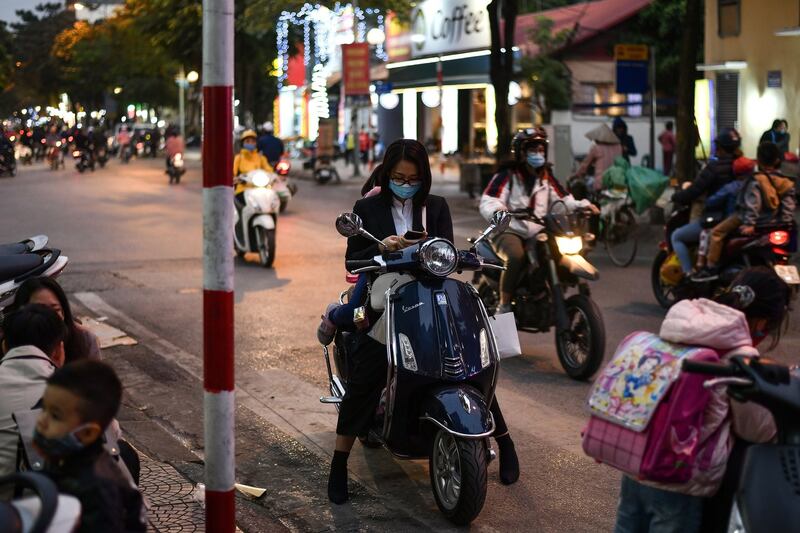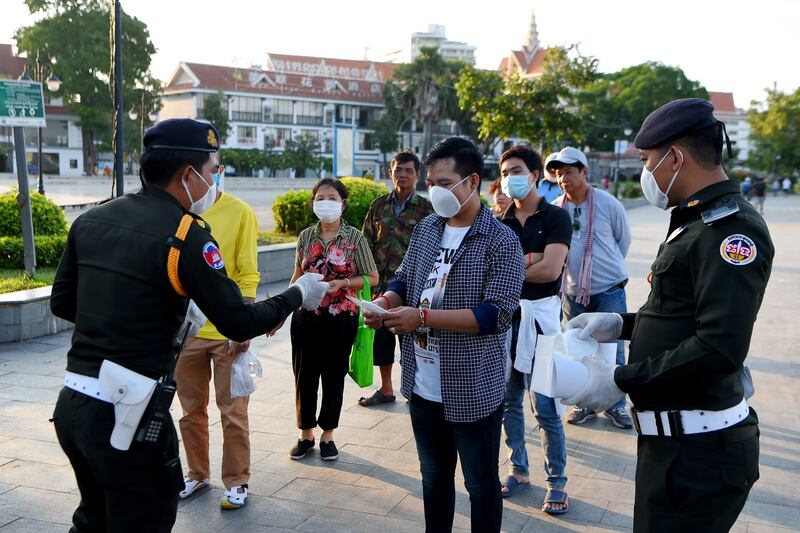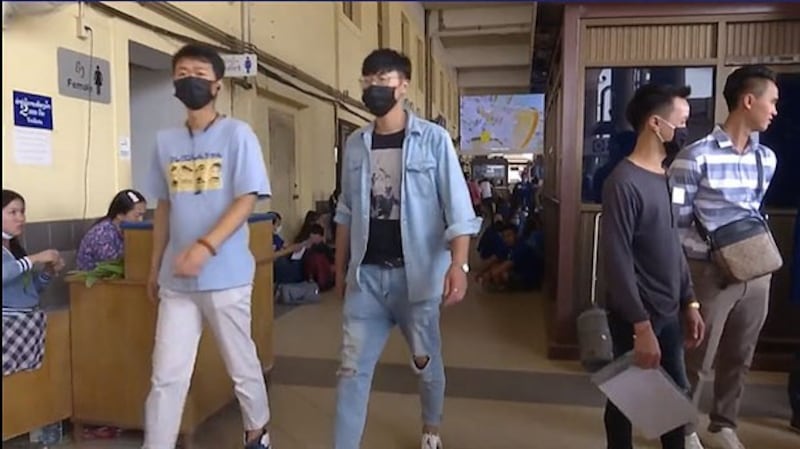Myanmar’s government is facing growing criticism from physicians and experts over its handling of the coronavirus pandemic as the country’s number of cases surpassed 90,000 for the first time Tuesday and the health crisis continued to hammer the Southeast Asian region in recent weeks.
Maw Maw Oo, a senior emergency physician at the Yangon General Hospital, told RFA’s Myanmar Service that the government must institute measures to more seriously contain the spread of the virus, which has now infected 92,189 people and is spreading to thousands of people daily.
The doctor added that medical staff at the facility are “exhausted” from the long fight working to save patients suffering from COVID-19, the disease caused by the coronavirus.
“Amid the prolonged pandemic, medical staff are becoming overburdened,” he said Tuesday.
“In some cases, they are forced to take long shifts with no time off, working day and night. Many feel disheartened. If the government doesn’t contain the virus effectively, hospital and clinics will not be able to handle the load. It will become a disaster if medical staff become exhausted and can no longer work.”
According to Myanmar’s Ministry of Health and Sports, more than 1,000 medical staff have been infected so far, leading to “several deaths.”
The ministry recently issued an order banning gatherings of more than 30 people, but members of the public are not adhering to the decree strictly enough, observers say, and the number of new cases has yet to decrease. So far, hospitals have been able to keep up with the number of patients, but it is unclear how long they will be able to do so.
Phyo Thiha, a physician and author, told RFA that authorities only talk about containment measures, “but don’t enforce them,” and tend to ignore large gatherings.
“Medical staff are the only ones shouldering the burden of the new incoming cases,” he said.
“It is concerning that non-COVID patients no longer receive enough attention. The government needs to change its policies with regards to handling the virus. It needs to create a new policy to reduce the workload of medical staff, instead of admitting every confirmed patient to the hospital.”
But Than Min Htut, the head of Pathein Hospital, in Myanmar’s Irrawaddy region, warned against adopting a policy of self-quarantining for people infected with the virus who aren’t in high-risk categories.
“In other countries, positive patients who are ordered to quarantine at home actually follow through, but our patients rarely follow orders,” he said.
“The system of quarantining at home depends on how well the people comply. If they don’t follow through, it could make the situation worse.”
Than Min Htut said there are more than 2,800 confirmed cases in the Irrawaddy region and that his hospital is treating 60 of 380 patients in Pathein alone.
The physician advised that the government enforce restrictions to prevent more cases, rather than implementing policies on which patients should be prioritized for hospital stays.
“If we have to take on more patients, we will have several problems—we are now reaching the limit,” he said.
“We also have a shortage of equipment. We are doing the best we can based on the current availability of equipment but in the case of a mass arrival of new patients, not all of them will have access to it.”
In addition to equipment shortages, medical facilities throughout the country are dealing with a lack of Personal Protective Equipment (PPE), he added.
A spokesman for Myanmar’s Ministry of Health said Tuesday that his agency is “working with experts to control the situation” and that each country is entitled to “fight the pandemic in its own way.”
In addition to the tens of thousands of positive cases, Myanmar reported 1,972 deaths from the virus as of Tuesday, according to data compiled by Johns Hopkins University.
The government on Monday extended a suspension on domestic flights until Dec. 15 and on international flights until Dec. 31. International flights have been grounded since March 19 in order to control the spread of the virus.

Vietnam
In Vietnam, the country’s Ministry of Health confirmed four new cases of the coronavirus on Tuesday, some three months after the last reported positive test, bringing the country’s total to 1,351.
One of the new cases, Patient 1347, is directly linked to Patient 1342, a flight attendant with Vietnam Airlines who tested positive on Sunday, the ministry said.
Patient 1342 caught the virus while coming into contact with Patient 1325, a colleague, while quarantining between Nov. 14 and 18 at a site set up by the airline in Ho Chi Minh City’s Tan Binh district.
After testing negative twice, Patient 1342 was permitted to undergo self-quarantine at a boarding house in the area, during which time he had close contact with his mother and two friends, the ministry said. However, a third test later determined he was positive for COVID-19.
Prior to testing positive, Patient 1347 taught English in at least two districts of Ho Chi Minh City and visited several areas of the city, leading to the infection of at least two other people—a 28-year-old student and a one-year-old boy.
Patients 1342 and 1347 are under quarantine and receiving treatment at the Cu Chi Field Hospital.
At an urgent meeting held Tuesday, Minister of Health Nguyen Thanh Long called on the Ho Chi Minh City Department of Health to promptly trace and test all people having contact with the new patients, and to place them under restrictive quarantine.
The department temporarily shuttered places Patient 1347 had visited for disinfecting and ordered that more than 2,000 students from two districts who came in contact with the English teacher stay home from school pending testing. It also held a meeting with representatives from 129 hospitals across the city to discuss measures for preventing the spread of the virus.
As of Tuesday, Vietnam had recorded 1,351 cases of the coronavirus, leading to 35 deaths.

Cambodia
The Ministry of Health in Cambodia recorded three new cases of COVID-19 in the country on Tuesday, bringing to 17 the number announced in the past three days.
The new cases were recorded from nearly 5,000 people who received tests for the coronavirus in the capital Phnom Penh and seven provinces amid an outbreak linked to the wife of Prisons Department director Chhem Savuth, the ministry said.
Chhem Savuth, his wife and four other family members have tested positive and are believed to have spread the virus to others as they met with people in the Ministry of Interior, prisons, shopping malls, and the school their son attends.
The three new cases on Tuesday were announced a day after Or Vandin, spokeswoman for the Ministry of Health, warned the public that Cambodia had “crossed a red line” and is at risk of a major outbreak. She urged people to stay home and cut down on any unnecessary travel.
Prime Minister Hun Sen, meanwhile, has authorized the Ministries of Health and Education to close all public schools, as well as some private schools and other facilities. He also ordered about 20 government officials who held meetings with Chhem Savuth in Phnom Penh and in the provinces to self-quarantine.
On Tuesday, Ministry of Health also called on nearly 100 members of the National Assembly to get tested for the virus and to self-quarantine after fellow lawmaker Loy Sophath met with Chhem Savuth on Nov. 25. The ministry said anyone who had been in contact with the Prisons Department director and other infected members of his family should also go for testing and self-quarantine.
Cambodia has so far reported a total of 326 cases of COVID-19 and no deaths. Twenty-two patients are currently receiving medical treatment, while the other 304 have recovered.

Laos
The government of Laos on Tuesday put into effect a new set of restrictions for the month of December after detecting 14 new infections, bringing the country’s total caseload to 39, with no deaths.
A member of the taskforce that handles the government’s response to the coronavirus said that the restrictions include halting the issuance of visas for foreigners and the suspension of chartered flights from countries with high rates of infection, with the exception of humanitarian flights. Other measures call for limited gatherings at home or in public.
The move is likely to put a damper on events planned to mark the 45th anniversary of the end of the Lao monarchy and the beginning of Communist rule on Dec. 2.
Last week, Vice Health Minister Phouthone Meuangpak announced that 14 people on two chartered flights carrying 111 passengers had tested positive for COVID-19. All 14 are receiving treatment, while the remaining passengers are in quarantine.
Many Laotians spoke in support of the new measures in effect for December, including one in the capital Vientiane, who told RFA’s Lao Service he particularly agrees with “restrictions on foreigners for our safety and protection.”
However, a hotelier in the city said that efforts to control the pandemic have shattered what remains of Laos’ flailing economy.
“It’s the same [restrictions s before]—the borders are still closed and businesses continue to suffer,” he said.
Reported by Kyaw Lwin Oo for RFA's Myanmar Service with additional reporting by RFA's Vietnamese, Khmer, and Lao Services. Translated by Ye Kaung Myint Maung for RFA's Myanmar Service, Huy Le for the Vietnamese Service, Maly Leng for the Khmer Service, and Max Avary for the Lao Service. Written in English by Joshua Lipes.
